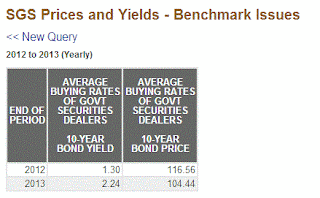The Twitter timing
We already know that Twitter will be valued well above
$10 b for its IPO. What we don't know yet is its true value. Not that it matters during an IPO process; here all that sellers need is a platform and right time to sell. In a weaker market, the proceeds would not be good enough. So Twitter thought
the current time is ripe for the moola:
The market is up from the lows of 2009 to what it is now. Good for the current shareholders. However, for the to-be shareholders it is a different game. There are at least two categories: Those who want to play the IPO game, the (very) shorter version, come what may. The early players might win the game, but those who time it late might suffer. Then there are those who want to play the longer version thinking that the business is good, the prospects are good, and therefore, they should be able to make a lot of money if they stayed long. They are hopeful.
Price and value
Hope is good. There is one problem, though. Everyone knows the price; none know the value. A dangerous combo. It matters less to the first category as they don't care about value. However, it is everything for the long-term players of the IPO game. Without understanding the true value of the firm, they play the game. Both are speculators; the punters. The lucky ones make money; others lose. If leverage is involved, what can we say? If none know the price either, no harm would be done; alas, it is not to be.
The sellers' market
The IPO is always about the sellers' market: They get to choose the time when they want to sell and the price at which they want to. The odds are in their favor, big time. And the buyers are in delusion. The financial history tells something. Oddly though, what we learn from it is that we don't learn from it.
Twitter won't care
It does not matter for Twitter or Facebook, or any other firm which investment banks they choose unlike
this report says. So what if Facebook price fell post IPO, and so what if LinkedIn rose? None were actually priced at their true value anyway. The sellers got the money they wanted. The future is all about actual performance. Comparisons to Facebook is inevitable. Facebook is now trading at the value of $112 b; its last twelve-month revenue is $6 b and operating income is $1.8 b. The market value is quite rich considering its current performance; but then the market discounts the projected performance based on its expectations. All Twitter and its folks want is as much stuff as possible at the cost of buyers.
Twitter value
Twitter is projected to make about
a billion in revenue in 2014. The ad revenues are very difficult to predict for the next year, leave alone for the next decade. Yet, what's the harm in predicting? When the market is fixated on $10 b plus, it is granted that Twitter is valued as such. No one will mention that it is less than that number. That's the crowd effect; the herd.
Nevertheless, valuing these firms is a tall order. Without having access to the historical financial performance and its business model, it is impossible to value Twitter. Even with these made available it is difficult to estimate future cash flows.
My valuation for Twitter at this stage is: it is not possible to value it. Sounds
familiar.
In spite of that lot many will give their value of Twitter. Sample this:
4) There are more numbers for sure.
Imagination knows no bounds. I envy the sellers and sympathize with the buyers.







